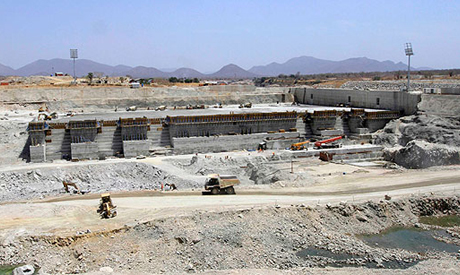
A general view shows construction activity on the Grand Renaissance Dam in Guba Woreda, Ethiopia, March 16, 2014 (Photo: Reuters).
Egypt's irrigation ministry announced on Saturday that the tenth round of talks on Ethiopia's Grand Renaissance Dam are tentatively scheduled to be held in Khartoum on 29-30 November, state-owned MENA agency reported.
An informed source told MENA that the final date and location of the talks, which were originally scheduled to be held on 21-23 November but were postponed on Thursday, will be decided soon.
The talks include the Egyptian, Sudanese and Ethiopian ministers of foreign affairs and of irrigation.
Informed sources told Al-Ahram daily newspaper that the reason behind the delay was "the Ethiopian irrigation minister’s foreign commitments and official visits.”
In September, Dutch consultancy firm Deltares, one of two foreign consultancy firms hired to study the effects of the GERD, withdrew from the assessment of the dam, saying that the conditions imposed by the tripartite national committee -- which includes representatives from Egypt, Sudan and Ethiopia, as well as the French consultancy firm BRL -- did not provide sufficient guarantee that an independent high-quality study could be carried out.
The tenth round of talks is a chance for the three concerned countries to mediate differences between Deltares and BRL.
Egyptian officials have repeatedly expressed concerns that Ethiopia's $4.2 billion hydroelectric dam on the Blue Nile, the construction of which is said to be at least 40 percent complete and is set to finish in 2017, would negatively affect its share of the Nile water.
According to the irrigation ministry, Egypt is suffering from a water deficit of 20 billion cubic metres, which it compensates through water recycling, an inadvisable process in the long term.
Short link: